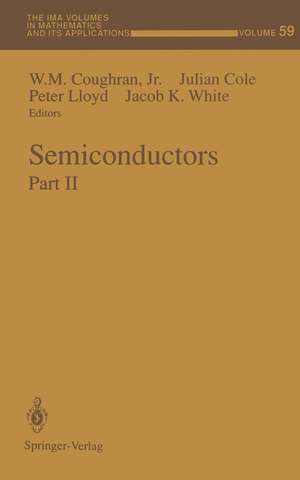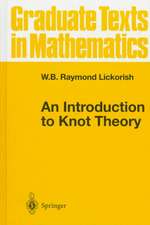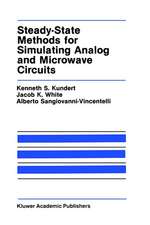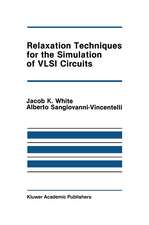Semiconductors: Part II: The IMA Volumes in Mathematics and its Applications, cartea 59
Editat de W. M. Jr. Coughran, Julian Cole, Peter Lloyd, Jacob K. Whiteen Limba Engleză Paperback – 8 noi 2011
| Toate formatele și edițiile | Preț | Express |
|---|---|---|
| Paperback (2) | 647.27 lei 6-8 săpt. | |
| Springer – 8 noi 2011 | 647.27 lei 6-8 săpt. | |
| Springer – 8 noi 2011 | 775.96 lei 6-8 săpt. |
Din seria The IMA Volumes in Mathematics and its Applications
- 18%
 Preț: 946.55 lei
Preț: 946.55 lei - 15%
 Preț: 639.73 lei
Preț: 639.73 lei - 15%
 Preț: 656.58 lei
Preț: 656.58 lei - 15%
 Preț: 642.03 lei
Preț: 642.03 lei - 15%
 Preț: 645.28 lei
Preț: 645.28 lei -
 Preț: 392.21 lei
Preț: 392.21 lei - 15%
 Preț: 642.83 lei
Preț: 642.83 lei - 15%
 Preț: 651.67 lei
Preț: 651.67 lei - 15%
 Preț: 651.19 lei
Preț: 651.19 lei -
 Preț: 385.84 lei
Preț: 385.84 lei - 15%
 Preț: 639.41 lei
Preț: 639.41 lei - 15%
 Preț: 643.34 lei
Preț: 643.34 lei - 15%
 Preț: 667.38 lei
Preț: 667.38 lei -
 Preț: 388.34 lei
Preț: 388.34 lei -
 Preț: 388.52 lei
Preț: 388.52 lei - 20%
 Preț: 333.40 lei
Preț: 333.40 lei - 15%
 Preț: 644.95 lei
Preț: 644.95 lei -
 Preț: 382.75 lei
Preț: 382.75 lei -
 Preț: 380.63 lei
Preț: 380.63 lei -
 Preț: 398.53 lei
Preț: 398.53 lei - 5%
 Preț: 1416.81 lei
Preț: 1416.81 lei -
 Preț: 382.36 lei
Preț: 382.36 lei -
 Preț: 380.25 lei
Preț: 380.25 lei -
 Preț: 399.67 lei
Preț: 399.67 lei - 15%
 Preț: 643.65 lei
Preț: 643.65 lei -
 Preț: 389.49 lei
Preț: 389.49 lei - 18%
 Preț: 944.19 lei
Preț: 944.19 lei - 20%
 Preț: 344.42 lei
Preț: 344.42 lei - 18%
 Preț: 948.92 lei
Preț: 948.92 lei - 5%
 Preț: 1419.39 lei
Preț: 1419.39 lei - 18%
 Preț: 945.30 lei
Preț: 945.30 lei
Preț: 647.27 lei
Preț vechi: 761.49 lei
-15% Nou
Puncte Express: 971
Preț estimativ în valută:
123.85€ • 129.06$ • 102.55£
123.85€ • 129.06$ • 102.55£
Carte tipărită la comandă
Livrare economică 03-17 aprilie
Preluare comenzi: 021 569.72.76
Specificații
ISBN-13: 9781461384120
ISBN-10: 1461384125
Pagini: 436
Ilustrații: XXII, 406 p.
Dimensiuni: 155 x 235 x 23 mm
Greutate: 0.61 kg
Ediția:Softcover reprint of the original 1st ed. 1994
Editura: Springer
Colecția Springer
Seria The IMA Volumes in Mathematics and its Applications
Locul publicării:New York, NY, United States
ISBN-10: 1461384125
Pagini: 436
Ilustrații: XXII, 406 p.
Dimensiuni: 155 x 235 x 23 mm
Greutate: 0.61 kg
Ediția:Softcover reprint of the original 1st ed. 1994
Editura: Springer
Colecția Springer
Seria The IMA Volumes in Mathematics and its Applications
Locul publicării:New York, NY, United States
Public țintă
ResearchCuprins
Semiconductors, Part II.- Device Modeling.- On the Child-Langmuir law for semiconductors.- A critical review of the fundamental semiconductor equations.- Physics for device simulations and its verification by measurements.- An industrial perspective on semiconductor technology modeling.- Combined device-circuit simulation for advanced semiconductor devices.- Methods of the kinetic theory of gases relevant to the kinetic models for semiconductors.- Shock waves in the hydrodynamic model for semiconductor devices.- Macroscopic and microscopic approach for the simulation of short devices.- Derivation of the high field semiconductor equations.- Energy models for one-carrier transport in semiconductor devices.- Some applications of asymptotic methods in semiconductor device modeling.- Discretization of three dimensional drift-diffusion equations by numerically stable finite elements.- Mathematical modeling of quantum wires in periodic heterojunction structures.- Numerical simulation of MOS transistors.- Scattering theory of high frequency quantum transport.- Accelerating dynamic iteration methods with application to semiconductor device simulation.- Boundary value problems in semiconductors for the stationary Vlasov-Maxwell-Boltzmann equations.- On the treatment of the collision operator for hydrodynamic models.- Adaptive methods for the solution of the Wigner-Poisson system.- The derivation of analytic device models by asymptotic methods.- Symmetric forms of energy — momentum transport models.- Analysis of the Gunn effect.- Some examples of singular perturbation problems in Device Modeling.


















